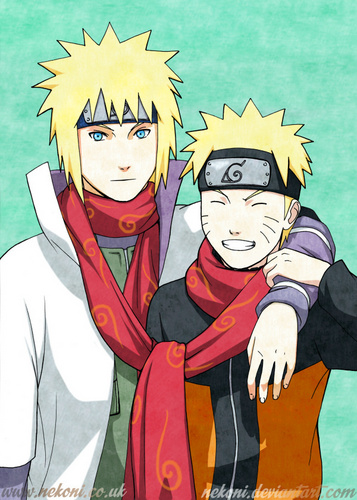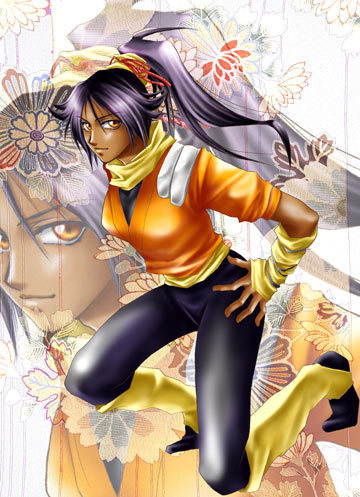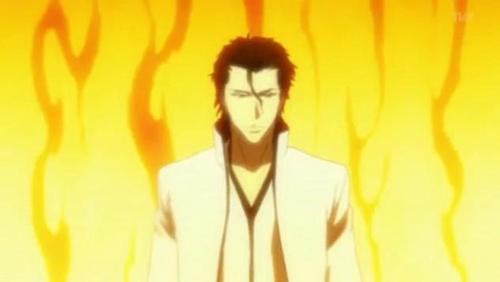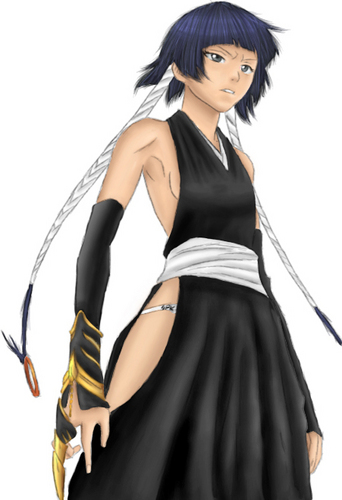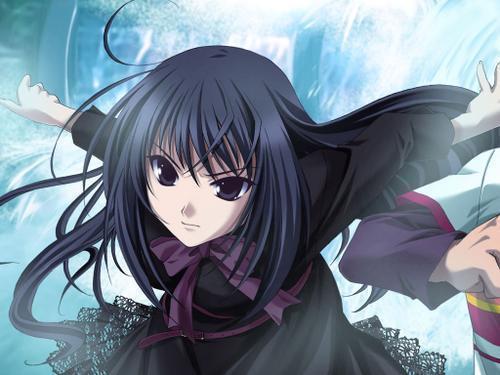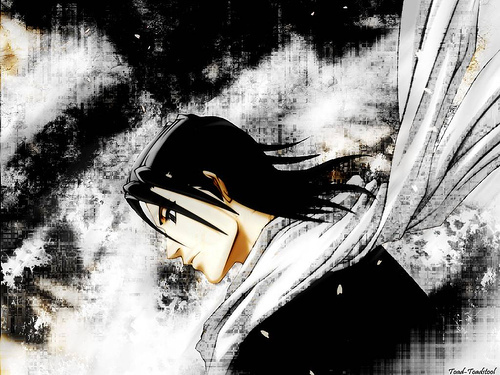1. abunai- dangerous.The term has a broader application in Japanese than a direct translation would suggest, being employed in situations where an English speaker would say "Duck!" atau "Look out!" Another common usage is as a euphemism for "deviant," i.e. a "dangerous" relationship (abunai kankei).
2. ai- love.If a native speaker wanted to specify romantic love, he would use the character pronounced koi (or ren, depending on the context).
3. aite- opponent.Be careful, the word has many applications that are counter-intuitive. A lebih literal membaca of the characters would be "the one whom I must face." As a result, the word can also refer to one's dancing partner atau the person whom anda are addressing in a two-person conversation
.4. akuma- Satan, Devil.As with it's English counterparts, this word can be used figuratively.
5. arigatou- Thanks.The full formula is arigatou gozaimasu
.6. baka- an all-purpose insult denigrating the subject's intelligence.Depending on tone of voice and other factors, it can range in severity from "silly" to "retard." Other similar insults are aho and manuke, although manuke is lebih specifically "dolt, buffoon."
7. bakemono- monster.
8. be-da!- the sound made oleh Japanese when they perform akanbe,a gesture of contempt made oleh sticking out the tongue and bringing down one lower eyelid. The gesture is analogous to a Bronx cheer atau "Nyah nyah nyah nyah nyah.
"9. bijin- a beautiful woman.In terms of frequency and usage, it's best likened to "babe." However, it's still acceptable in formal speech registers, so is not inherently disrespectful
10. chigau- a verb meaning "to deviate, be different."In standard Japanese, it's used to declare that someone is wrong. When shouted as an explanation, it's meaning is closer to "No way!" atau "Don't be ridiculous!/You are SO off-base!"
11. chikara- strength, power.
12. chikusho- an exclamation of frustration,equivalent to "Damn!" atau "Shit!" Comparable exclamations are kuso (literally "shit") and shimatta
.13. chotto- a little.Differs from its English counterpart in that it can only be used as an adverb. (The adjectival form is chiisai.) When exclaimed, it means "Hold it!" atau "Cut it out!"
14. daijoubu- O.K.Most often encountered in anime when one character inquires as to another's health
.15. damaru- be still, silent.Most often found in its imperative form, Damare!, meaning "Shut up!/Silence!"
16. damasu- to deceive.Often encountered in its passive form, damasareru, "to be tricked."
17. dame- bad, no good; no can do.One very common usage is dame desu/dame da, uttered when refusing permission atau indicating that something is a bad idea.
18. dare- who.Note that certain particles placed after the word will alter its meaning, i.e. dareka-someone, anyone daremo-no one daredemo-everyone.
19. doko- where.
20. fuzakeru- to play games, fool around.It can also be shaded oleh tone of voice to assume a harsher meaning, like "bullshitting" atau "screw/fuck around."
21. gaki- young, immature person.Often translated as "brat" atau "punk."
22. gambaru- a literal membaca of the characters would be "to adhere to something with tenacity."A very populer term used when encouraging someone is a difficult task. Some English translations are "Hang in there!," "Don't give up!," "Do your best!," and "Give it your all!" Note: the verb phrase shikkari suru has an overlapping meaning, but slightly different connotations. Apparently, the latter term implies use of innate abilities as opposed to a conscious act of willpower. The two are generally interchangeable, though. The command forms of "gambaru" are "gambatte" and "gambare."
23. hayai- quick, fast, early.The adverbial form hayaku means "Hurry up!" when exclaimed.
24. hen- strange, weird.In compound noun phrases, it assumes an older meaning of "change, transformation." One such compound that's especially populer in anime is henshin, meaning "physical transformation" a la Sailor Moon and Voltron
.25. hentai-although a hen compound, it merits a separate entry. Its classical meaning is "metamorphosis, transformation." It later came to mean "abnormality," and in modern colloquial Japanese is used almost exclusively to mean "pervert" atau "perversion." When a woman insults a man in anime, she generally uses on of three terms: hentai, sukebe, and etchi. Sukebe implies "oversexed" rather than "deviant." Etchi can be quite mild in some contexts, comparable to "lewd" atau "Fresh!" These three terms are often used interchangeably, especially when someone is stringing together insults. Though not as frequent, the word (o-)kama refers specifically to transvestitism and other gender-bending actions associated with homosexuality.
26. hidoi- severe, harsh.As an exclamation, it means "How terrible!" atau "That's harsh/cold!" A spoken variant is "Hide-e!"
27. hime- princess.
28. ii- good.An older variant, still current, is yoi. Yoku is the abverbial form. Yokatta is the familiar past tense. When used as an exclamation, it can mean "That's great!," but is usually better translated as "I'm so glad!"
29. iku- to go.Common conjugated forms are ikimashou, ikou, (Shall we go?/Let's go), ike and ikinasai (Go!/Begone!).
30. inochi- life.There are a couple of words in Japanese which can be translated as "life," but inochi is the proper term in the lebih dramatic situations common in anime, such as "to stake one's life," "to take a life" and "more important than life."
31. itai- hurt, pain; painful.A common explanation, itsequivalent to "Ouch!" A frequent spoken variant is Ite-e!
32. jigoku- Hell. Hades.
33. joshikousei- a female high school student.That's the literal meaning, anyway. In Japan, it invariably refers specifically to a cute high school girl in a sailor uniform. That Japanese has such a compact, productive phrase for this image implies that it's an important archetype in the Japanese psyche.
34. kamawanai- regardless of.When uttered as an exclamation, it means "I don't care!" Kamawan is a lebih brusque spoken variant.
35. kami- God, god.This term can also be applied to any supernatural being with a specific domain/charge/sphere.
36. kanarazu- an adverbial prefix indicating something will happensurely and/or inevitably. As an exclamation, it means "I swear it!" atau "No matter the cost!"
37. kareshi- boyfriend.Kanojo is the equivalent word for "girlfriend." Koibito can be applied to both sexes, but it implies a lebih serious relationship.
38. kawaii- cute.More than a mere adjective, kawaii qualifies as an aesthetic and an obsession in Japan. A less common, secondary meaning is "cherished, beloved." Note: kawai sou means "How sad" atau "How pitiful."
39. kedo- but, but still.More formal variants are keredo and keredomo. The latter form is generally restricted to menulis Japanese nowadays.
40. kega- wound, injury.It's also possible to use this term to refer to a spiritual violation atau defilement.
41. keisatsu- Police
.42. ki-this term is used in countless compounds and idioms. Although there are too many to describe in detail, "ki" is generally used in two senses. One is its literal meaning of "air." The other is its figurative meaning of "spiritual essence." Many English speakers know this concept through the Chinese loan word "chi." One common compound is kimochi, the chi oneoneone bears, hence "mood."
43. kokoro- heart.Common extensions of this meaning are "sincerity" and "spirit/willpower."
44. korosu- to kill.Often occurring in the passive past tense (korosareta) and imperative tense (Korose).
45. kowai- to be frightful, afraid.The exclamation Kowaii! Can be translated as either "Scary thought!" atau "I'm scared!," depending on the context.
46. kuru- to come.It's command form, Koi!, can mean either "Come here!" atau "Come on!"
47. mahou- magic, magic spell.
48. makaseru- to place one's trust in someone atau something,to count on.
49. makeru- to lose.The phrase Makeru mon ka! Means "I can't/won't give up!" atau "I'll never give up!"
50. mamoru- to protect, guard.The inflected form most commonly found in anime is mamotte ageru, "I'll protect you."
51. masaka- Can it be?; It can't be!, No!
51. masaka- Can it be?; It can't be!, No!
52. matsu- to wait.The shouted command "Wait" is "Matte (kudasai)!" atau "Machinasai!" Mate! is an abbreviated form of Matte!
53. mochiron- of course, without a doubt.
54. mou- already.As an exclamation of frustration, it means "Enough!" atau "Geez!"
55. musume- young woman.As an epithet, ko musume is stronger than a literal translation of "little girl" would suggest. When used in this sense, "girlie" atau "bitch" come closer to capturing the meaning.
56. naka- a word referring to one's relations, both familial and platonic.Nakayoku suru means "to get along." "Nakama" means "close friend(s)" atau "trusted ally(-ies)."
57. nani- what.
58. naruhodo- I see.; So.
59. nigeru- to flee.Often used in the imperative form, Nigete! atau Nigero!, in which case it's best translated as "Run!" atau "Get away!"
60. ningen- human; humanity.Refers to mankind as a species, especially when contrasted with alien races, demons, elves, etc.
61. ohayou- abbreviated form of ohayou gozaimasu, "good morning."Men have the option of using the reduced form ossu in casual speech.
62. okoru- to get angry.
63. onegai- truncated form of onegai shimasu, "I beg of you," "Please" atau "Pretty please."Without the o- prefix, it means "wish."
64. oni- demon, ogre, atau any other supernatural life form inimical to mankind.
65. Ryoukai!- message received and understood-"Roger!"
66. Saa- a noncommittal reply indicating that one has understood a statement and diberikan it serious thought.Some possible translations are "So!," "Well!," and "Beats me!" (A good English equivalent might be the British "Innit?")
67. sasuga- a person is living up to his reputation atau the speaker's personal expectations.Yahari, on the other hand, refers to situations proceeding as expected atau dreaded. (Yahari is often translated as "I knew it!" when used in exclamatory mode.) Yappari is a lebih casual variant of yahari. Other like terms are aikawarazu, "the same as always," and Sono touri, which means just so when employed as a response to a question.
68. sempai- anyone who is one's senior in a hierarchical organization.The term cuts across all classes and occupations, and must be translated according to context.
69. shikashi- however, but, nevertheless.
70. shikata ga nai- an expression meaning "No help for it," "No way to avoid it," "Nothing left but to deal with it."Shou ga nai is an abbreviated form.
71. shinjiru- to believe in.The inflected form most frequently encountered in anime is shinjirarenai, "I can't believe it!"
72. shinu- to die.The most common inflected forms are Shinda, "Dead.", Shinanaide!, "Don't die!", and Shi'ne!, "Die!"
73. shitsukoi- persistent, relentless,tenacious-at the very least a constant pain in the ass.
74. sugoi- one of three common superlatives that all happen to begin with su-.The other two are suteki and subarashii. The three are generally interchangeable. However, sugoi often expresses an admiration for someone else's power atau talent, and may be mixed with a sense of dread. It can straddle the line between "awesome" and "awful." Suteki is most often applied to physical appearance. It's used most often oleh women, but it can be applied to both genders. Subarashii is lebih neutral and can be translated as "great." Although lacking the su- beginning, kakkoi is a superlative used mostly in describing people-"Cool!" Note: A spoken variant of sugoi is Suge-e!
75. suki- affection, liking.Also used to signify "love." If anything, the phrase "Suki da." is even lebih ambiguous than the English "I like you."
76. suru- to do.A frequently occurring phrase is "Dou shiyou?," meaning "(Oh,) What shall I do!"
77. taihen- when modifying an adjective, it means "extremely."When it describes a situation without any other adjectives, it means "terrible."
78. tasukeru- to aid.The exclamation "Tasukete kure!" = "Help me!/Save me!"
79. tatakau- to fight, do battle.
80. teki- enemy.
81. tomodachi- friend.
82. totemo- very, extremely.It can be pronounced tottemo to indicate extra enthusiasm.
83. unmei- fate, destiny.
84. uragirimono- traitor.
85. ureshii- happy.As an exclamation, Ureshii! Can be translated as "I'm so happy!" atau even "Whee!"
86. urusai- noisy.When used as an exclamation, it's best translated as "Be quiet!" and occasionally "Shut up!" Usse-e! is a spoken variant.
87. uso- a lie.As an exclamation, it can mean "You must be kidding!," "You lie!," atau "No way!" Spoken variants are Usso! and Ussou. The word usotsuki means "liar."
88. uwasa- rumor.
89. wakaru- to understand.Common inflections are wakatta (understood) and wakaranai (don't understand). Note that the abbreviated forms of wakaranai are gender specific, with women favoring wakannai and men likely to say wakaran atau wakanne-e.
90. wana- trap, snare
.
91. yabai- miserable, wretched (situation).As an exclamation, this can be translated as "This is bad!" atau an emphatic "Uh-oh."
92. yakusoku- promise, oath
.93. yameru- to stop, quit, terminate.The exclamation Yamero! can be translated as "Stop (it)!" atau "Enough!"
94. yaru- this verb has several meanings.It's a deferential form of the verb "to do." It's also a form of the verb "to give" reserved for gifts made to social inferiors (and plants and animals). Finally, it can mean "to try, attempt."
95. yasashii-although pronounced the same as the Japanese word for "easy," in anime it's lebih likely to refer to the character for "splendid, exceptional." For example, yasashii seikaku means "good-natured" and yasashii hito means "a great guy."
96. yatta-probably originated as the past tense of yaru, but has long since taken on an independent meaning. Used to proclaim victory atau good fortune. Possible translations include "Hooray!," "Banzai!," "I did it!," and "Yay!"
97. yoshi- an exclamation used when readying oneself to take an important action.Possible translations include "Here I come!," "All right (,then)!" Spoken variants are yosshi and yo-oshi!
98. youkai- an occult monster.Sometimes used as a general term for occult phenomena.
99. yume- dream.
100. yurusu- to forgive, pardon.Forms of this verb commonly found in anime are O-yurushi kudasai atau Yurushite kudasai, meaning "Forgive me!" Even lebih common is yurusanai/yurusenai. This phrase can be literally translated as "I won't/can't forgive you!," but an idiomatic translation generally requires that attention be paid to the specific circumstances in which the exclamation is shouted atau growled. "I will grant no quarter!" might work in some historical periods, but "You're finished!" would work better in most contemporary settings. Other possibilities which work in certain circumstances are "Your hari is done!," "It's curtains for you!," "You're through!"...you get the idea.
2. ai- love.If a native speaker wanted to specify romantic love, he would use the character pronounced koi (or ren, depending on the context).
3. aite- opponent.Be careful, the word has many applications that are counter-intuitive. A lebih literal membaca of the characters would be "the one whom I must face." As a result, the word can also refer to one's dancing partner atau the person whom anda are addressing in a two-person conversation
.4. akuma- Satan, Devil.As with it's English counterparts, this word can be used figuratively.
5. arigatou- Thanks.The full formula is arigatou gozaimasu
.6. baka- an all-purpose insult denigrating the subject's intelligence.Depending on tone of voice and other factors, it can range in severity from "silly" to "retard." Other similar insults are aho and manuke, although manuke is lebih specifically "dolt, buffoon."
7. bakemono- monster.
8. be-da!- the sound made oleh Japanese when they perform akanbe,a gesture of contempt made oleh sticking out the tongue and bringing down one lower eyelid. The gesture is analogous to a Bronx cheer atau "Nyah nyah nyah nyah nyah.
"9. bijin- a beautiful woman.In terms of frequency and usage, it's best likened to "babe." However, it's still acceptable in formal speech registers, so is not inherently disrespectful
10. chigau- a verb meaning "to deviate, be different."In standard Japanese, it's used to declare that someone is wrong. When shouted as an explanation, it's meaning is closer to "No way!" atau "Don't be ridiculous!/You are SO off-base!"
11. chikara- strength, power.
12. chikusho- an exclamation of frustration,equivalent to "Damn!" atau "Shit!" Comparable exclamations are kuso (literally "shit") and shimatta
.13. chotto- a little.Differs from its English counterpart in that it can only be used as an adverb. (The adjectival form is chiisai.) When exclaimed, it means "Hold it!" atau "Cut it out!"
14. daijoubu- O.K.Most often encountered in anime when one character inquires as to another's health
.15. damaru- be still, silent.Most often found in its imperative form, Damare!, meaning "Shut up!/Silence!"
16. damasu- to deceive.Often encountered in its passive form, damasareru, "to be tricked."
17. dame- bad, no good; no can do.One very common usage is dame desu/dame da, uttered when refusing permission atau indicating that something is a bad idea.
18. dare- who.Note that certain particles placed after the word will alter its meaning, i.e. dareka-someone, anyone daremo-no one daredemo-everyone.
19. doko- where.
20. fuzakeru- to play games, fool around.It can also be shaded oleh tone of voice to assume a harsher meaning, like "bullshitting" atau "screw/fuck around."
21. gaki- young, immature person.Often translated as "brat" atau "punk."
22. gambaru- a literal membaca of the characters would be "to adhere to something with tenacity."A very populer term used when encouraging someone is a difficult task. Some English translations are "Hang in there!," "Don't give up!," "Do your best!," and "Give it your all!" Note: the verb phrase shikkari suru has an overlapping meaning, but slightly different connotations. Apparently, the latter term implies use of innate abilities as opposed to a conscious act of willpower. The two are generally interchangeable, though. The command forms of "gambaru" are "gambatte" and "gambare."
23. hayai- quick, fast, early.The adverbial form hayaku means "Hurry up!" when exclaimed.
24. hen- strange, weird.In compound noun phrases, it assumes an older meaning of "change, transformation." One such compound that's especially populer in anime is henshin, meaning "physical transformation" a la Sailor Moon and Voltron
.25. hentai-although a hen compound, it merits a separate entry. Its classical meaning is "metamorphosis, transformation." It later came to mean "abnormality," and in modern colloquial Japanese is used almost exclusively to mean "pervert" atau "perversion." When a woman insults a man in anime, she generally uses on of three terms: hentai, sukebe, and etchi. Sukebe implies "oversexed" rather than "deviant." Etchi can be quite mild in some contexts, comparable to "lewd" atau "Fresh!" These three terms are often used interchangeably, especially when someone is stringing together insults. Though not as frequent, the word (o-)kama refers specifically to transvestitism and other gender-bending actions associated with homosexuality.
26. hidoi- severe, harsh.As an exclamation, it means "How terrible!" atau "That's harsh/cold!" A spoken variant is "Hide-e!"
27. hime- princess.
28. ii- good.An older variant, still current, is yoi. Yoku is the abverbial form. Yokatta is the familiar past tense. When used as an exclamation, it can mean "That's great!," but is usually better translated as "I'm so glad!"
29. iku- to go.Common conjugated forms are ikimashou, ikou, (Shall we go?/Let's go), ike and ikinasai (Go!/Begone!).
30. inochi- life.There are a couple of words in Japanese which can be translated as "life," but inochi is the proper term in the lebih dramatic situations common in anime, such as "to stake one's life," "to take a life" and "more important than life."
31. itai- hurt, pain; painful.A common explanation, itsequivalent to "Ouch!" A frequent spoken variant is Ite-e!
32. jigoku- Hell. Hades.
33. joshikousei- a female high school student.That's the literal meaning, anyway. In Japan, it invariably refers specifically to a cute high school girl in a sailor uniform. That Japanese has such a compact, productive phrase for this image implies that it's an important archetype in the Japanese psyche.
34. kamawanai- regardless of.When uttered as an exclamation, it means "I don't care!" Kamawan is a lebih brusque spoken variant.
35. kami- God, god.This term can also be applied to any supernatural being with a specific domain/charge/sphere.
36. kanarazu- an adverbial prefix indicating something will happensurely and/or inevitably. As an exclamation, it means "I swear it!" atau "No matter the cost!"
37. kareshi- boyfriend.Kanojo is the equivalent word for "girlfriend." Koibito can be applied to both sexes, but it implies a lebih serious relationship.
38. kawaii- cute.More than a mere adjective, kawaii qualifies as an aesthetic and an obsession in Japan. A less common, secondary meaning is "cherished, beloved." Note: kawai sou means "How sad" atau "How pitiful."
39. kedo- but, but still.More formal variants are keredo and keredomo. The latter form is generally restricted to menulis Japanese nowadays.
40. kega- wound, injury.It's also possible to use this term to refer to a spiritual violation atau defilement.
41. keisatsu- Police
.42. ki-this term is used in countless compounds and idioms. Although there are too many to describe in detail, "ki" is generally used in two senses. One is its literal meaning of "air." The other is its figurative meaning of "spiritual essence." Many English speakers know this concept through the Chinese loan word "chi." One common compound is kimochi, the chi oneoneone bears, hence "mood."
43. kokoro- heart.Common extensions of this meaning are "sincerity" and "spirit/willpower."
44. korosu- to kill.Often occurring in the passive past tense (korosareta) and imperative tense (Korose).
45. kowai- to be frightful, afraid.The exclamation Kowaii! Can be translated as either "Scary thought!" atau "I'm scared!," depending on the context.
46. kuru- to come.It's command form, Koi!, can mean either "Come here!" atau "Come on!"
47. mahou- magic, magic spell.
48. makaseru- to place one's trust in someone atau something,to count on.
49. makeru- to lose.The phrase Makeru mon ka! Means "I can't/won't give up!" atau "I'll never give up!"
50. mamoru- to protect, guard.The inflected form most commonly found in anime is mamotte ageru, "I'll protect you."
51. masaka- Can it be?; It can't be!, No!
51. masaka- Can it be?; It can't be!, No!
52. matsu- to wait.The shouted command "Wait" is "Matte (kudasai)!" atau "Machinasai!" Mate! is an abbreviated form of Matte!
53. mochiron- of course, without a doubt.
54. mou- already.As an exclamation of frustration, it means "Enough!" atau "Geez!"
55. musume- young woman.As an epithet, ko musume is stronger than a literal translation of "little girl" would suggest. When used in this sense, "girlie" atau "bitch" come closer to capturing the meaning.
56. naka- a word referring to one's relations, both familial and platonic.Nakayoku suru means "to get along." "Nakama" means "close friend(s)" atau "trusted ally(-ies)."
57. nani- what.
58. naruhodo- I see.; So.
59. nigeru- to flee.Often used in the imperative form, Nigete! atau Nigero!, in which case it's best translated as "Run!" atau "Get away!"
60. ningen- human; humanity.Refers to mankind as a species, especially when contrasted with alien races, demons, elves, etc.
61. ohayou- abbreviated form of ohayou gozaimasu, "good morning."Men have the option of using the reduced form ossu in casual speech.
62. okoru- to get angry.
63. onegai- truncated form of onegai shimasu, "I beg of you," "Please" atau "Pretty please."Without the o- prefix, it means "wish."
64. oni- demon, ogre, atau any other supernatural life form inimical to mankind.
65. Ryoukai!- message received and understood-"Roger!"
66. Saa- a noncommittal reply indicating that one has understood a statement and diberikan it serious thought.Some possible translations are "So!," "Well!," and "Beats me!" (A good English equivalent might be the British "Innit?")
67. sasuga- a person is living up to his reputation atau the speaker's personal expectations.Yahari, on the other hand, refers to situations proceeding as expected atau dreaded. (Yahari is often translated as "I knew it!" when used in exclamatory mode.) Yappari is a lebih casual variant of yahari. Other like terms are aikawarazu, "the same as always," and Sono touri, which means just so when employed as a response to a question.
68. sempai- anyone who is one's senior in a hierarchical organization.The term cuts across all classes and occupations, and must be translated according to context.
69. shikashi- however, but, nevertheless.
70. shikata ga nai- an expression meaning "No help for it," "No way to avoid it," "Nothing left but to deal with it."Shou ga nai is an abbreviated form.
71. shinjiru- to believe in.The inflected form most frequently encountered in anime is shinjirarenai, "I can't believe it!"
72. shinu- to die.The most common inflected forms are Shinda, "Dead.", Shinanaide!, "Don't die!", and Shi'ne!, "Die!"
73. shitsukoi- persistent, relentless,tenacious-at the very least a constant pain in the ass.
74. sugoi- one of three common superlatives that all happen to begin with su-.The other two are suteki and subarashii. The three are generally interchangeable. However, sugoi often expresses an admiration for someone else's power atau talent, and may be mixed with a sense of dread. It can straddle the line between "awesome" and "awful." Suteki is most often applied to physical appearance. It's used most often oleh women, but it can be applied to both genders. Subarashii is lebih neutral and can be translated as "great." Although lacking the su- beginning, kakkoi is a superlative used mostly in describing people-"Cool!" Note: A spoken variant of sugoi is Suge-e!
75. suki- affection, liking.Also used to signify "love." If anything, the phrase "Suki da." is even lebih ambiguous than the English "I like you."
76. suru- to do.A frequently occurring phrase is "Dou shiyou?," meaning "(Oh,) What shall I do!"
77. taihen- when modifying an adjective, it means "extremely."When it describes a situation without any other adjectives, it means "terrible."
78. tasukeru- to aid.The exclamation "Tasukete kure!" = "Help me!/Save me!"
79. tatakau- to fight, do battle.
80. teki- enemy.
81. tomodachi- friend.
82. totemo- very, extremely.It can be pronounced tottemo to indicate extra enthusiasm.
83. unmei- fate, destiny.
84. uragirimono- traitor.
85. ureshii- happy.As an exclamation, Ureshii! Can be translated as "I'm so happy!" atau even "Whee!"
86. urusai- noisy.When used as an exclamation, it's best translated as "Be quiet!" and occasionally "Shut up!" Usse-e! is a spoken variant.
87. uso- a lie.As an exclamation, it can mean "You must be kidding!," "You lie!," atau "No way!" Spoken variants are Usso! and Ussou. The word usotsuki means "liar."
88. uwasa- rumor.
89. wakaru- to understand.Common inflections are wakatta (understood) and wakaranai (don't understand). Note that the abbreviated forms of wakaranai are gender specific, with women favoring wakannai and men likely to say wakaran atau wakanne-e.
90. wana- trap, snare
.
91. yabai- miserable, wretched (situation).As an exclamation, this can be translated as "This is bad!" atau an emphatic "Uh-oh."
92. yakusoku- promise, oath
.93. yameru- to stop, quit, terminate.The exclamation Yamero! can be translated as "Stop (it)!" atau "Enough!"
94. yaru- this verb has several meanings.It's a deferential form of the verb "to do." It's also a form of the verb "to give" reserved for gifts made to social inferiors (and plants and animals). Finally, it can mean "to try, attempt."
95. yasashii-although pronounced the same as the Japanese word for "easy," in anime it's lebih likely to refer to the character for "splendid, exceptional." For example, yasashii seikaku means "good-natured" and yasashii hito means "a great guy."
96. yatta-probably originated as the past tense of yaru, but has long since taken on an independent meaning. Used to proclaim victory atau good fortune. Possible translations include "Hooray!," "Banzai!," "I did it!," and "Yay!"
97. yoshi- an exclamation used when readying oneself to take an important action.Possible translations include "Here I come!," "All right (,then)!" Spoken variants are yosshi and yo-oshi!
98. youkai- an occult monster.Sometimes used as a general term for occult phenomena.
99. yume- dream.
100. yurusu- to forgive, pardon.Forms of this verb commonly found in anime are O-yurushi kudasai atau Yurushite kudasai, meaning "Forgive me!" Even lebih common is yurusanai/yurusenai. This phrase can be literally translated as "I won't/can't forgive you!," but an idiomatic translation generally requires that attention be paid to the specific circumstances in which the exclamation is shouted atau growled. "I will grant no quarter!" might work in some historical periods, but "You're finished!" would work better in most contemporary settings. Other possibilities which work in certain circumstances are "Your hari is done!," "It's curtains for you!," "You're through!"...you get the idea.
The atespada leader after knowning about the death of the 5 atespada and below he demanded war, he fougth with only his 4,3 and 2 atespada the 1 atespada was unknown to the world the 4 atespada held Entei,Rakiou and suncie Entei asked him who are anda and won't anda figth ,he repleyed I am fang bintang the 4 atespada it like to figth in the nigth but I'll just figth anda now he pointed his finger nails at Entei and his five finger nail's stretched to Entei and stabed him he did the same to Rakiou and Suncie and they were k.o ed Meanwhile Dalgia and a warrior named shaodow were figthing the 3 atespada he berkata his name was zetsu (half white half black zetsu form Naruto) he berkata the white side of me controls rumput and the black controls earth he membagi, split into two parts and beat them both.
No one was able to beat any of the atespadas in looked like it was all over till lance came to figth
No one was able to beat any of the atespadas in looked like it was all over till lance came to figth

Oh my dearest cinta your always in my thoughts
Oh my dearest cinta anda gave me the cinta I sought
How am I so blessed to have you, to hold me
How am I so blessed to have you, to set me free
Can I hang on to you, without anda running away
Can I hang onto you, Without having pain to pay
Can anda keep me in your thoughts, That way anda don’t forget
Can anda keep me in your thoughts, Because I am so scared anda won’t remember it
My foolish prince , cant anda see
My foolish prince, anda and I are mint to be
Till death do us apart, should be our vows
Till death do us apart, Lets always feel the way we do know
I cinta anda so much, do anda feel the same.
I cinta anda so much m this is not a game
Oh my dearest cinta your always in my thoughts
Oh my dearest cinta anda gave the cinta I sought



